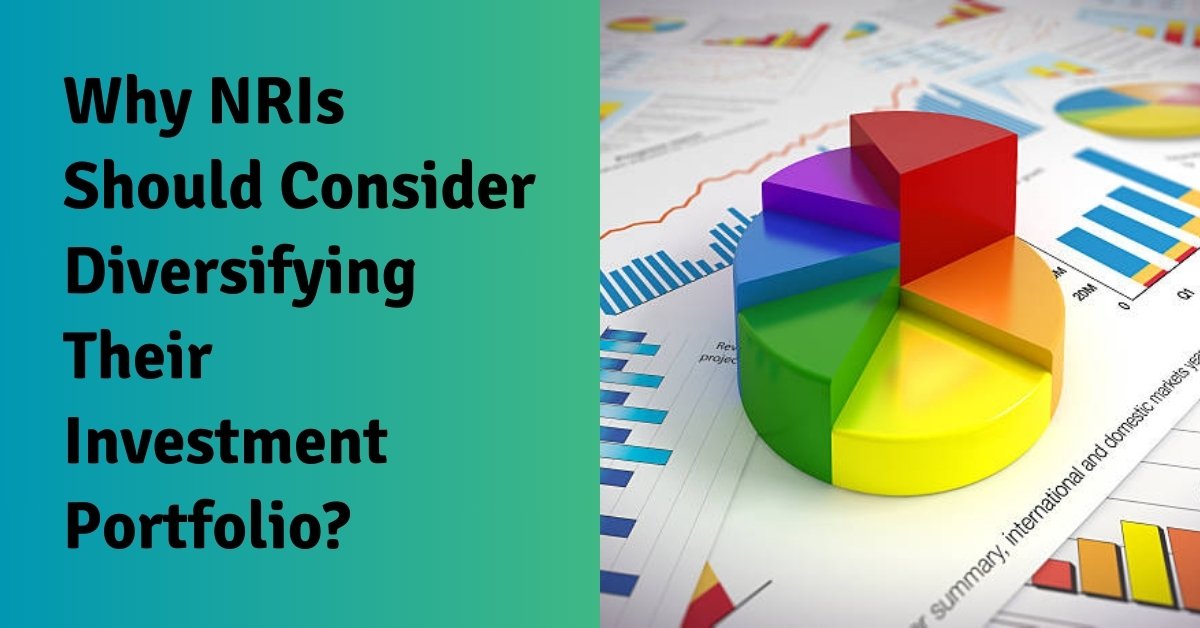As a Non-Resident Indian (NRI), you have a unique opportunity to invest in multiple countries. But with this opportunity comes the need to make smart investment choices. One of the most important strategies in investing is diversification. Let’s explore why diversifying your investment portfolio is crucial for NRIs and how you can go about it.
What is Diversification?
Diversification is like the old saying, “Don’t put all your eggs in one basket.” In investing, it means spreading your money across different types of investments. This could include stocks, bonds, real estate, and other assets. It also means investing in different countries, industries, and companies.
Why is Diversification Important for NRIs?
As an NRI, you’re in a special position. You might have ties to India and your country of residence, and maybe even other countries. This gives you more options for investing, but it also means you need to be extra careful about how you spread your investments.
Diversification is important for several reasons:
- Reducing Risk: When you spread your investments, you reduce the risk of losing all your money if one investment performs poorly. For example, if you invest only in one country’s stock market and that market crashes, you could lose a lot. But if you’ve invested in multiple countries, the impact would be less severe.
- Balancing Returns: Different investments perform differently at various times. When one type of investment is not doing well, another might be performing better. This balance can help smooth out your overall returns over time.
- Taking Advantage of Global Opportunities: As an NRI, you have the chance to invest in fast-growing economies like India, as well as more stable markets in developed countries. This can give you a good mix of growth potential and stability.
- Managing Currency Risk: When you invest in different countries, you’re also dealing with different currencies. Diversifying can help protect you from big swings in currency exchange rates.
- Preparing for Life Changes: Your plans might involve moving back to India, staying in your current country, or even moving somewhere else. Having a diversified portfolio can give you more flexibility for these potential changes.
How Can NRIs Diversify Their Portfolio?
Here are some ways you can diversify your investments as an NRI:
- Invest in Different Asset Classes: Don’t just focus on one type of investment. Consider a mix of stocks, bonds, real estate, and maybe even commodities. Each of these responds differently to economic conditions, which can help balance your overall portfolio.
- Look at Different Countries: While investing in India can be attractive, don’t forget about opportunities in your country of residence and other global markets. This geographical diversification can help spread your risk.
- Consider Various Industries: Don’t put all your money in one sector, like technology or healthcare. Spread your investments across different industries. This way, if one sector faces challenges, your entire portfolio won’t be affected.
- Mix Company Sizes: Invest in a combination of large, established companies and smaller, growing companies. This can give you a balance of stability and growth potential.
- Use Mutual Funds and ETFs: These investment vehicles can be an easy way to diversify, as they often hold a variety of stocks or bonds in a single fund.
- Don’t Forget Fixed Income: While stocks can offer growth, bonds, and other fixed-income investments can provide stability and regular income. This is especially important as you get closer to your financial goals.
- Consider Real Estate: Property investments in India or your country of residence can be another way to diversify. Just remember that real estate can be less liquid than other investments.
You may like to read: Creating a Balanced Financial Portfolio as a Returning NRI
Challenges in Diversification for NRIs
While diversification is important, it does come with some challenges for NRIs:
- Complexity: Managing investments in multiple countries can be complicated. You’ll need to keep track of different tax laws, regulations, and market conditions.
- Costs: Investing internationally might involve higher fees for transactions and currency conversions. Make sure these costs don’t eat into your returns too much.
- Information Overload: With investments spread across different countries, you’ll need to keep up with a lot of information. This can be time-consuming and sometimes overwhelming.
- Compliance Issues: Make sure you’re following all the rules for international investments in both India and your country of residence. This might require help from financial and legal experts.
The Importance of Professional Advice
Given these complexities, many NRIs find it helpful to work with a financial advisor who understands cross-border investing. A good advisor can help you create a diversified portfolio that matches your goals, risk tolerance, and unique situation as an NRI.
Conclusion
Diversification is a key strategy for any investor, but it’s especially important for NRIs. By spreading your investments across different assets, countries, and industries, you can better manage risk and take advantage of global opportunities. Remember, the goal of diversification isn’t to maximize returns but to optimize your portfolio for your specific goals and risk tolerance. As you build your diversified portfolio, make sure to regularly review and adjust it to keep it aligned with your changing needs and market conditions.
FAQs
- How much of my portfolio should I invest in India vs. other countries?
Ans- There’s no one-size-fits-all answer. It depends on your goals, risk tolerance, and future plans. A common approach is to have a significant portion in your country of residence and India, with some exposure to other global markets. - Can I diversify my portfolio with just mutual funds?
Ans- Yes, mutual funds can be an excellent tool for diversification. Look for funds that invest in different asset classes, countries, and sectors. - How often should I review my diversified portfolio?
Ans- It’s good to review your portfolio at least once a year, or when you experience significant life changes. - Is it risky to invest in countries other than India and my country of residence?
Ans- All investments carry some risk. Investing in other countries can actually help spread your risk, but make sure you understand the specific risks of each market. - Should I invest in gold as part of my diversification strategy?
Ans- Gold can be part of a diversified portfolio, especially as a hedge against inflation and currency fluctuations. However, it shouldn’t make up a large portion of your investments. - How does diversification affect my tax situation?
Ans- Investing in multiple countries can complicate your taxes. You might need to report income and gains in different countries. It’s best to consult with a tax advisor familiar with international tax laws. - Can real estate in India be part of my diversified portfolio?
Ans- Yes, real estate in India can be a good diversification tool. It can provide rental income and potential appreciation. Just be aware of the regulations around NRIs owning property in India. - Is it better to invest directly in stocks or use mutual funds for diversification?
Ans- For most people, mutual funds offer an easier way to diversify. They provide professional management and instant diversification. However, some investors prefer the control of choosing individual stocks. - How does currency exchange risk affect a diversified portfolio?
Ans- When you invest in different countries, changes in exchange rates can affect your returns. Diversification across currencies can help manage this risk, but it doesn’t eliminate it entirely. - Can I over-diversify my portfolio?
Ans- Yes, it’s possible to over-diversify. This can happen when you have so many different investments that it becomes hard to manage, or when the benefits of diversification are outweighed by increased costs or complexity.
Disclaimer: The information provided here is for educational and informational purposes only and should not be construed as financial, legal, or tax advice. Consult with a qualified professional before making any investment decisions. We do not accept any liability for errors or omissions in this information nor any direct, indirect, or consequential losses arising from its use.





